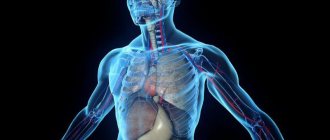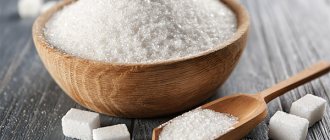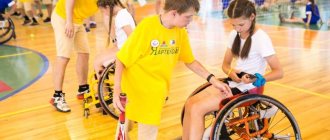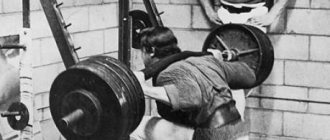The benefits of playing sports
It is worth immediately noting that morning exercises and a five-minute warm-up are not included in the concept of sports, but are types of physical activity. The correct definition of the word sport is grueling exercise with maximum impact, load on a specific muscle group for each specific type of training.
What are the benefits of sports in a person’s life? It’s worth thinking about and, if necessary, making some adjustments to your usual way of life. It is important to identify all the pros and cons of the chosen sports section, so as not to experience disappointment or provoke harm.
Physical activity of varying intensity should be present in everyone’s usual routine. Sport is important in the lives of children and benefits adults. Systematic exercise helps achieve goals.
Character modeling
Sports sections and clubs provide discipline and make a person self-confident. People who play sports make decisions faster and gain leadership skills. Particularly effective and beneficial in developing the qualities of a socially active person are sections with group sports.
Increased endurance and strengthened muscles
In the course of overcoming loads, endurance is developed step by step. Visually, you can notice a transformation when beautiful reliefs appear in the body, muscle plasticity develops, and excess fat disappears.
Improved mood and well-being
Sport energizes, accelerates sleep, and increases productivity. By following the regime, a person gets the opportunity to live a rich, full life.
Losing excess weight
The benefits of sport are obvious, as it helps to get rid of obesity. Excessive obesity is a source of disease, leading to dysfunction of body systems. By performing intense physical activity, a person controls his gastronomic preferences and does not consume foods that can be harmful to health.
Strengthening the Heart
A vital organ ensures proper blood circulation and delivery of nutrients to the organs. Dysfunction can cause various pathologies, including hypoxia. Sports exercises provide the heart with a feasible load and gradually strengthen it. Systematic training eliminates the likelihood of developing atherosclerosis, coronary heart disease, and heart attack. The impact of sport on the cardiovascular system is predominantly positive if you approach the issue wisely.
Memory improvement
Sport, regardless of direction, brings benefits by improving brain nutrition, which leads to clarity of thinking, improved coordination, and full perception of information. School-age children especially need this.
Respiratory development
Proper breathing is the main thing in sports. Violation of its conditions can nullify all efforts. An increase in the volume of the inhaled area of the lungs ensures the absence of hypoxia in the cells.
Boosting immunity
People who have sports in their lives are always in excellent shape. They are extremely rarely affected by infections. The benefits of sports for children's health are obvious, since stable immunity is the key to well-being.
We recommend reading: Foods rich in estrogen for women: detailed list, table
Improved sleep
Due to fatigue, after physical exercise, concepts such as depression, anxiety, and sleep disturbances disappear in the life of a person who is passionate about sports. A person gets quality rest at night, which leads to harmony and tranquility.
Acceleration of metabolism
Sport benefits the digestive system by promoting proper bowel function. During training, metabolic products are released through the skin from the body through sweat. Well-established metabolic processes do not allow toxins, free radicals and waste to linger.
Risk factors
Sports are especially harmful to health because there is a danger of various injuries. For example, professional football players or boxers suffer more than one fracture and concussion during their short careers. And the number of simple bruises and sprains, perhaps, cannot be counted. Also, some sports have a strong impact on certain parts of the body and muscle groups. For example, tennis, badminton, fencing or shooting involve only one hand. Therefore, sometimes the consequences of many years of training appear, such as disruption of the functioning of internal organs and curvature of the spine. This especially needs to be taken into account when planning a sports career for beginning athletes.
What are the benefits of sports for children and teenagers?
Sports are important in children's lives. Besides keeping your child busy and having a good time, there are plenty of other benefits to consider. The benefits of sport are:
- in strengthening barrier functions;
- formation of endurance, strength;
- positive effect on bone structure;
- strengthening the vascular walls and heart muscles - eliminating hypertension in the future;
- development of stress resistance;
- formation of correct self-esteem, adequate response to criticism;
- obtaining the makings of a leader;
- influence on physical development;
- acquiring social skills, the ability to work in a team.
The influence of sport on the development of adolescents is great, since strong immunity protects against colds that interfere with development. All systems work fully, the muscle corset is strengthened, and the development of scoliosis and osteochondrosis is excluded. Important! The habit of exercising is beneficial because it is incompatible with smoking and alcohol abuse. In addition, teenagers channel all their energy in healthy ways and do not deliberately harm themselves.
The harm of sports: fiction or harsh reality
Constantly increasing loads wear out the joints, heart, and muscles. But most often, professional sports hit those who leave it. The loads to which the athlete is accustomed suddenly suddenly disappear, and the body is urgently forced to adapt to a new regime. And since the reserve of safety is usually exhausted by this moment, not everyone is able to adapt to such a restructuring. That is why doctors advise, after leaving professional sports, not to quit training abruptly, but to gradually reduce the load and stop at the minimum that will maintain the tone of the muscles and the body as a whole.
Which sport to choose
Interest in sports should be instilled from childhood. During adolescence, changes occur in the heart muscle and blood vessels, preparing the fragile body for more difficult periods.
Attending school and sitting at a desk for a long time forces you to be in a sedentary position for a long period of time. Inaction of parents can cause harm to the growing body due to improper formation of the skeleton.
A teenager should be active for at least an hour a day; the task of adults is to select dosed exercises that are beneficial and make sports a part of life.
Important! Children and teenagers are not as resilient as adults and it must be taken into account that they expend more energy for each action.
Whatever sport is chosen, the benefits will outweigh the harm rates.
Preference should be given to general strengthening types of exercise that have a positive effect on the musculoskeletal system and the full functioning of the heart. The benefits of sports for human health in adolescence come from the following types:
- swimming;
- run;
- Biking.
When choosing a direction, you should pay attention to the teenager’s physique.
Important! A child with short stature will not be able to excel in basketball, but if he has strong legs, he could very well perform well in running. You should also pay attention to temperament. An active child will not be interested in playing chess, but in a team game he will have no equal.
When choosing a section for girls, parents always try to develop plasticity, femininity, and slimness. Most often, preference is given to gymnastics and dancing.
Swimming is considered a universal sport and it is suitable for everyone, regardless of age and gender type. It is prescribed to healthy children, as well as for many pathologies: exercise in water minimizes harm.
On what basis do you choose a section for children?
Many parents think about this question long before their child starts attending school. Quite often, 5-6 year old children regularly study in some section. When deciding to take this important step, you need to worry about whether sport is harmful to health? Then consult with your pediatrician to eliminate the risk of exacerbations if you have any medical conditions. Many doctors recommend starting with dancing classes, thanks to which the baby will learn to move without overworking himself, and will also get used to a new, clearer daily routine.
Rules for playing sports
Passion for sports is one of the important points of a healthy lifestyle, from which people mainly derive benefits. Accordingly, the approach to it should be conscious and serious. First of all, it’s worth understanding what not to do.
Exercises without shoes
Sneakers are selected for the sport, as the wrong shoes can cause harm to the spine. Important! Exercising barefoot or wearing socks increases pressure on your back. If you are prone to vascular diseases, the harm from exercise increases significantly.
We recommend reading: What are the benefits of onion peels, medicinal properties and contraindications
Quench your thirst “at will”
Don't wait until the desire to drink becomes unbearable. Passion for training is not a reason to lead the body to dehydration. You should make it a rule to take a few sips of water every 20 minutes.
Training in worn, old things
The training suit must be of good quality. The fabric composition, in addition to cotton, preferably contains lycra. Cotton clothes become saturated with sweat, blocking air access to the pores. Things that are many years old, but it would be a shame to throw them away, should not be used in training.
Using anti-sweat deodorants
Excessive sweating during intense exercise is a natural condition. With sweat, harmful substances are removed from the body. Antiperspirants close pores and stop sweat from escaping. In order to easily eliminate products that cause harm to the body during sports, you should stop using skin care products during exercise.
Listen to music on headphones
It has been scientifically proven that intense workouts should not be performed while listening to loud music. If it is impossible without musical accompaniment, it must be made quieter. If you ignore the recommendation, one day you may lose the ability to hear.
Asphalt is not a place for jogging
Asphalt roads are harmful to the ankles, knees, and hip joints, since they do not absorb shocks when the runner pushes away. The best place for running is a track in a hall, stadium, park - along flat paths.
Basic rules for playing sports for the benefit of the body:
- Sports training can be carried out at home, in the park, forest, sports clubs with professional support from a trainer.
- Beginners should not be overzealous, as they can cause harm to tendons, muscle fibers, ligaments, myocardium, and blood vessels. Before the first lesson, you should consult a doctor and get recommendations from a trainer. The increase in loads should be gradual. Sets of exercises should be selected taking into account the real capabilities of the body. The section leader can advise you on how to get the maximum benefit from your training.
- If the goal of your passion is to correct your figure, you need to understand that exercise alone cannot influence your weight globally. Additionally, nutritional adjustments are required.
To play sports with health benefits, you need to develop a system. Sports will become a habit more easily when a person gets the first stable results. The researchers concluded that to obtain them when running, continuous exercise for 21 days is necessary.
The most beneficial types of physical activity
It turns out that in order to start improving your health, it is not at all necessary to purchase a gym membership or buy special exercise equipment for exercising at home. An ordinary walk in the park can easily turn into your first workout, because walking and running are the safest and most beneficial sports. Especially if classes are carried out outdoors.
So you want to start improving your health? Include at least half-hour jogging. Such fitness events are easiest to organize for owners of four-legged friends who are accustomed to regular early morning walks in any weather. Other most beneficial sports activities include cycling and swimming. It is best, of course, to combine various physical exercises to engage all muscles and organs. In addition, not only the body, but also the spirit must be healthy. Yoga classes will help you strengthen yourself mentally.
As you can see, sport is not always harmful to health. Find your sweet spot and go for it!
Disadvantages of playing sports
The influence of sport on the human body is ambiguous. The wrong approach to stress and the pursuit of quick results can cause irreparable harm. What to pay attention to:
- When practicing, you need to be able to stop in time.
The first workouts should not be intense. Excessive hobbies quickly wear out systems and organs, leading to premature old age, which negates all ideas about benefits. Important! Sports have their own rules that must be followed - training cannot be approached only intuitively. - Energy drinks, stimulants and what bodybuilders call sports nutrition actually pose a risk of causing stress: the products give athletes endurance, but consume untouchable energy reserves.
- Requirements for yourself must be objective. If you are underweight, for example, excess exercise can be harmful.
In a professional sense, there is practically no talk about the positive impact of sport on human health. For most people, their careers end with pathological disorders of the joints, skeleton, and digestive system.
What to do?
“There have already been studies in which similar vascular changes were detected in athletes,” explains cardiologist, MD, head of the department and scientific secretary of the Moscow State Medical University. Evdokimova Yuri Vasyuk .
— And in principle it’s clear why this happens. Heavy loads not only train the heart muscle, but are also stressful for blood vessels: increased pressure during long and intense exercise has the same effect as arterial hypertension. Because of this, mechanisms are triggered that contribute to the development of atherosclerosis and calcium deposition in blood vessels. It seems that in this case exactly these mechanisms were at work, because people who were intensely involved in physical exercise experienced the same stress as athletes. But, of course, additional research is needed here to find out all the details. If we talk about practical advice, it is better to exclude static loads and heavy lifting. With such exercises, large muscle groups are tensed, and this helps to increase blood pressure. Calm running, Nordic walking with poles, swimming and other moderate aerobic exercise are still useful if you follow a number of rules.
The main thing is to focus not on the kilometers of distance, but on the state of the body. This can be determined by heart rate, calculating the optimal load using Shepard's very simple formula (see infographic). With its help you will determine the maximum allowable heart rate during exercise for your age. It’s good if during exercise your heart rate is 50-60% of the maximum. This usually corresponds to a feeling of light sweating. Try to stick to that load.”











